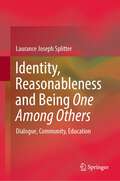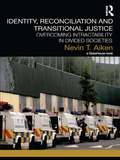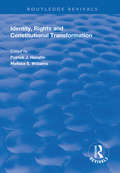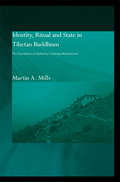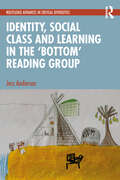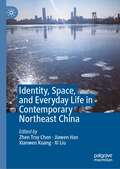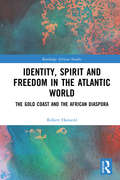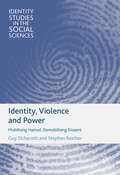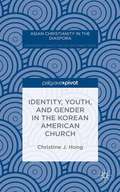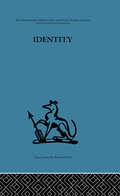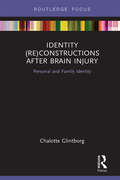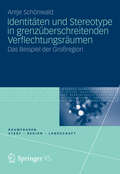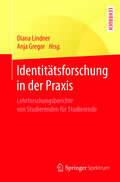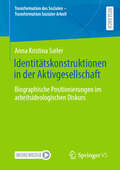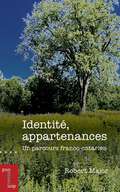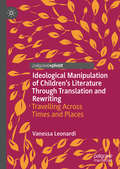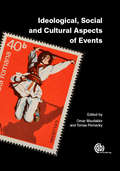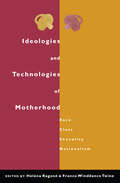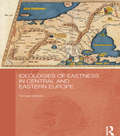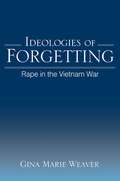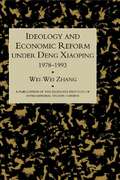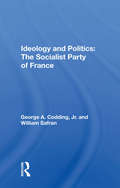- Table View
- List View
Identity, Reasonableness and Being One Among Others: Dialogue, Community, Education
by Laurance Joseph SplitterThis book brings the tools and ideas of Anglo-American analytic philosophy to bear on how we think about issues of contemporary significance, in a way that is accessible to a broad audience. While acknowledging empirical findings within the social sciences, it takes on the prescriptive task of imagining a better world, in which being citizens in a democracy means actively engaging with others. We cling to tribal affiliations which incline us to look inward and spurn those whom we deem to be “other.” And we observe the mind-numbing, herd-like impact of social (and other) media on our capacity – and that of our children – to distinguish truth and good sense from falsehood and nonsense. Such problems demand our attention as reasonable persons who both think for themselves, and deliberate in good faith with others with whom they may well disagree. The good news is that while reasonableness cannot be taken for granted, it can – indeed, it must – be nurtured and it must be taught. This book both articulates a conception of reasonableness and exemplifies a clear standard of reasonableness, with respect to the questions it raises and the author's responses to them.
Identity, Reconciliation and Transitional Justice: Overcoming Intractability in Divided Societies
by Nevin T. AikenBuilding upon an interdisciplinary synthesis of recent literature from the fields of transitional justice and conflict transformation, this book introduces a groundbreaking theoretical framework that highlights the critical importance of identity in the relationship between transitional justice and reconciliation in deeply divided societies. Using this framework, Aiken argues that transitional justice interventions will be successful in promoting reconciliation and sustainable peace to the extent that they can help to catalyze those crucial processes of ‘social learning’ needed to transform the antagonistic relationships and identifications that divide post-conflict societies even after the signing of formal peace agreements. Combining original field research and an extensive series of expert interviews, Aiken applies this social learning model in a comprehensive examination of both the South African Truth and Reconciliation Commission and the uniquely ‘decentralized’ approach to transitional justice that has emerged in Northern Ireland. By offering new insight into the experiences of these countries, Aiken provides compelling firsthand evidence to suggest that transitional justice interventions can best contribute to post-conflict reconciliation if they not only provide truth and justice for past human rights abuses, but also help to promote contact, dialogue and the amelioration of structural and material inequalities between former antagonists. Identity, Reconciliation and Transitional Justice makes a timely contribution to debates about how to best understand and address past human rights violations in post-conflict societies, and it offers a valuable resource to students, scholars, practitioners and policymakers dealing with these difficult issues.
Identity, Rights and Constitutional Transformation (Routledge Revivals)
by Melissa S. Williams Patrick J. HanafinFirst published in 1999 , this book provides an analysis of the role of constitutional governance from an international and interdisciplinary perspective. The range of disciplines represented in the collection of papers aims to open new perspectives on topics that are frequently left to the expert hands of political scientists and layers alone. It reveals scope for the further study of historical, cultural and rhetorical approaches in tandem with traditional approaches. The blend of cross-national experience and comparisons and the fertilisation of one discipline by another should appeal to a wide interdisciplinary audience.
Identity, Ritual and State in Tibetan Buddhism: The Foundations of Authority in Gelukpa Monasticism (Routledge Studies in Tantric Traditions)
by Martin A. MillsThis is a major anthropological study of contemporary Tibetan Buddhist monasticism and tantric ritual in the Ladakh region of North-West India and of the role of tantric ritual in the formation and maintenance of traditional forms of state structure and political consciousness in Tibet. Containing detailed descriptions and analyses of monastic ritual, the work builds up a picture of Tibetan tantric traditions as they interact with more localised understandings of bodily identity and territorial cosmology, to produce a substantial re-interpretation of the place of monks as ritual performers and peripheral householders in Ladakh. The work also examines the central and indispensable role of incarnate lamas, such as the Dalai Lama, in the religious life of Tibetan Buddhists.
Identity, Social Class and Learning in the ‘Bottom’ Reading Group (Routledge Advances in Critical Diversities)
by Jess AndersonThe common practice of ability-grouped reading in UK schools, often termed guided reading, influences children’s sense of identity, feelings and progress as readers. Drawing on a rich ethnographic study of three primary classrooms, this book reopens a critical inquiry into ability-grouped reading that has been quiet since the 1990s, when guided reading in literacy education became established practice in the UK and the US.Through the lens of children’s agency in accommodating, resisting and at times transforming such reading pedagogy, the book shows how readers are shaped by ability-grouped reading and by the more egalitarian reading pedagogies introduced in the study. Children’s individual and collective experiences are brought to life through extended narratives that attend as closely to gesture, posture, visage, silences and prosody of speech as to spoken words.The book ends with a provocation: how literacy pedagogy might change if reflexive noticing and dismantling of hierarchies become the compass of pedagogical change. This demands attention to structural inequalities around race, gender and class and a turn towards deep listening to children. As well as being a valuable read for scholars of the sociology of childhood and education, it should appeal to anyone concerned with making education more equitable, including teachers, school leaders, parents, carers and policymakers.
Identity, Space, and Everyday Life in Contemporary Northeast China
by Jiawen Han Xi Liu Zhen Troy Chen Xianwen KuangThis edited volume is first of its kind to document and critically analyse the changes took place snice China’s opening-up and reform and its impact on Dongbei, China’s North-East region, known for its remote and vast landscape, unique and othered culture, rich resources, mighty infrastructures and industries, geopolitical significance. Through presenting up-to-date and multidimensional case studies, the book covers three major aspects of Dongbei, which put people at the heart of our scholarly focus, namely people’s mediated life through traditional and new media; people’s social, cultural, and living spaces; artistic and fictional representations of people’s everyday life.
Identity, Spirit and Freedom in the Atlantic World: The Gold Coast and the African Diaspora (Routledge African Studies)
by Robert HanserdThis book applies oral, archival and other interdisciplinary evidence from West Africa and the Americas to analyses of new world Maroons, slaves and free blacks, examining a "Gold Coast" entrepot of Akan, Ga, Guan and other peoples in an Atlantic era of non-linear, mutable intersection of contested history and culture. Combining extant evidence with newer interdisciplinary insights to reconsider under-recognized histories and actors, Identity, Spirit and Freedom in the Atlantic World explores West African cosmologies, regional statecraft and socio-cultural practice, and the way they contributed to Atlantic ideas of freedom, identity and spirituality. Archival researches of British, Dutch and Danish Atlantic thoroughfares bring to light histories of royals, priests and others remade as captive laborers, Maroons and free blacks. Looking at Akwamu’s overtaking of Great Accra, Jamaica’s Maroon Wars, the 1712 Rebellion in New York and many other examples, this book explores the evolution of identity and spirituality in the diaspora of the Gold Coast and the Atlantic world. Identity, Spirit and Freedom in the Atlantic World will be of interest to scholars and students of African studies, the African diaspora, cultural studies and Atlantic and American history.
Identity, Violence and Power: Mobilising Hatred, Demobilising Dissent (Identity Studies in the Social Sciences)
by Guy Elcheroth Stephen ReicherThis book provides a systematic examination of the re-patterning of collective identities through violence and the role of power politics in such critical transitions. The authors show how identity is created through shared social practices and how it is transformed when collective violence disrupts common practices. Three case studies show how this model sheds new light on the dynamics of religious violence in parts of India, on ethnic violence in the former Yugoslavia, as well as on anti-war protest in the UK in reaction to the military invasion of Iraq. The book explores an alternative way of looking at conflict, and dissects the policies and processes that bring specific identities to the fore, taking seriously the capacity to resist and face abusive authority. Identity, Violence and Power will be of interest to students and scholars of sociology, social psychology, history, political science and conflict studies.
Identity, Violence and Power: Mobilising hatred, Demobilising Dissent (Identity Studies in the Social Sciences)
by Guy Elcheroth Stephen ReicherThis book provides a systematic examination of the re-patterning of collective identities through violence and the role of power politics in such critical transitions. The authors show how identity is created through shared social practices and how it is transformed when collective violence disrupts common practices. Three case studies show how this model sheds new light on the dynamics of religious violence in parts of India, on ethnic violence in the former Yugoslavia, as well as on anti-war protest in the UK in reaction to the military invasion of Iraq. <p><p> The book explores an alternative way of looking at conflict, and dissects the policies and processes that bring specific identities to the fore, taking seriously the capacity to resist and face abusive authority. <p> Identity, Violence and Power will be of interest to students and scholars of sociology, social psychology, history, political science and conflict studies.
Identity, Youth, and Gender in the Korean American Church
by Christine J. HongThis book studies Korean American girls between thirteen and nineteen and their formation with regard to self, gender, and God in the context of Korean American protestant congregational life. It develops a hybrid methodology of de-colonial aims and indigenous research methods, aiming to facilitate transformative life in faith communities.
Identity: Mental health and value systems
by Kenneth SoddyTavistock Press was established as a co-operative venture between the Tavistock Institute and Routledge & Kegan Paul (RKP) in the 1950s to produce a series of major contributions across the social sciences. This volume is part of a 2001 reissue of a selection of those important works which have since gone out of print, or are difficult to locate. Published by Routledge, 112 volumes in total are being brought together under the name The International Behavioural and Social Sciences Library: Classics from the Tavistock Press. Reproduced here in facsimile, this volume was originally published in 1961 and is available individually. The collection is also available in a number of themed mini-sets of between 5 and 13 volumes, or as a complete collection.
Identity: Personal and Family Identity (Interdisciplinary Disability Studies)
by Chalotte GlintborgIdentity (Re)constructions After Brain Injury: Personal and Family Identity investigates how being diagnosed with acquired brain injury (ABI) impacts identity (re)construction in both adults with ABI and their close relatives. To show how being diagnosed with ABI impacts identity (re)construction, this book investigates key patterns of identity construction. Discourse analysis, especially on the concept of positioning, provides an understanding of the changes and developmental processes in these self-narratives. These narrative (re)constructions point to a developmental change of identity in the course of the different phases of the recovery process for both persons with ABI and their relatives, including conflicting voices from society, service providers, relatives, and other adults with ABI. In addition, the (re)construction process is characterized by much ambivalence in both ABI survivors and relatives. Three perspectives are triangulated: (1) an insider perspective from ABI survivors; (2) an insider perspective from relatives; and (3) an outsider perspective from the researchers. This allows us to see how identities are negotiated and constructed in concrete situations. This innovative book will be required reading for all students and academics working in the fields of disability studies, rehabilitation psychology, sociology, allied health, and social care.
Identitäten und Stereotype in grenzüberschreitenden Verflechtungsräumen
by Antje SchönwaldAnhand von qualitativen Interviews mit Akteuren des grenzüberschreitenden Verflechtungsraums Großregion untersucht Antje Schönwald Identitäten und Stereotype sowie deren Auswirkungen auf das Handeln jenseits traditioneller Raumvorstellungen. Die Autorin analysiert Entstehung und Folge von Kategorisierungen in der grenzüberschreitenden Kooperation und das Verhältnis von Selbst- und Fremddarstellung. Außerdem nimmt sie eine Typisierung großregionaler Identitäten vor.Anhand von qualitativen Interviews mit Akteuren des grenzüberschreitenden Verflechtungsraums Großregion untersucht Antje Schönwald Identitäten und Stereotype sowie deren Auswirkungen auf das Handeln jenseits traditioneller Raumvorstellungen. Die Autorin analysiert Entstehung und Folge von Kategorisierungen in der grenzüberschreitenden Kooperation und das Verhältnis von Selbst- und Fremddarstellung. Außerdem nimmt sie eine Typisierung großregionaler Identitäten vor.
Identitätsarbeit beim Übergang in die Pension: Prozesse und Inhalte der prospektiven Auseinandersetzung mit Identitätsentwürfen und die Bedeutung der individuellen Kapitalausstattung (Vechtaer Beiträge zur Gerontologie)
by Julia ReinerAngesichts des Spannungsfelds aus Gewinnen und Verlusten, neuen Gestaltungsfreiheiten und -notwendigkeiten kann der Übergang in die Pension als besonders sensible Phase für Identitätsarbeit erachtet werden. Dies gilt speziell für die zukunftsorientierte Auseinandersetzung mit Identitätsentwürfen im Sinne von prospektiver Identitätsarbeit. Im Rahmen einer mehrphasigen Mixed-Methods-Studie untersucht Julia Reiner Prozesse und Inhalte von prospektiver Identitätsarbeit beim Übergang in die Pension und stellt in diesem Zusammenhang auch die Frage nach der Bedeutung der individuellen Kapitalausstattung. Durch die Verschränkung unterschiedlicher theoretischer Perspektiven und deren empirische Bearbeitung leistet die Untersuchung einen wertvollen Beitrag für die Identitäts- und Pensionierungsforschung sowie für Fragen sozialer Ungleichheit in diesen beiden Forschungsfeldern.
Identitätsforschung in der Praxis
by Diana Lindner Anja GregorIn vier Kapiteln bietet das Buch einen Überblick über aktuelle Themen der Identitätsforschung. Die Auswahl an qualitativen, empirischen Forschungsberichten reicht von der Analyse narrativer Identität, über Biographieforschung zur Asexualität und Grounded Theory zur religiösen Vergemeinschaftung bis hin zu einer Gruppendiskussion über Stigmatisierungserfahrungen bei Muslimen. Methodisch kamen zwei Interviewstudien, eine Ethnografie und eine Gruppendiskussion zur Anwendung. LeserInnen erfahren, wie ein Forschungsbericht aussehen kann, welche Ergebnisse in der Kürze der Zeit von einer Gruppe von Forschungsneulingen erzielt werden können und was alles bei so einem Projekt zu bedenken ist. Studierende lernen aber nicht nur, eine Lehrforschung zu planen, durchzuführen und zu schreiben, sie bekommen auch Einblick in klassische Identitätstheorien sowie aktuelle und einzigartige Studien im Bereich der Identitätsforschung. Dieses Buch ist von Bachelor-Studierenden der Soziologie geschrieben und bietet Neulingen auf dem Gebiet der qualitativen Sozialforschung Orientierung und wertvolle Tipps für die Umsetzung des ersten eigenen Forschungsprojekts. Zugleich ist das Buch für all jene lesenswert, die sich mit neuen Erkenntnissen aus dem Bereich der Identitätsforschung vertraut machen wollen.
Identitätskonstruktionen in der Aktivgesellschaft: Biographische Positionierungen im arbeitsideologischen Diskurs (Transformation des Sozialen – Transformation Sozialer Arbeit #10)
by Anna Kristina SailerAnna Kristina Sailer nimmt auf Basis einer narrativen Analyse die Identitätskonstruktionen junger Erwachsener in der Aktivgesellschaft in den Blick. Der Begriff der Aktivgesellschaft umschreibt dabei das veränderte Verhältnis von Individuum und Erwerbsarbeit. Dabei geht die Autorin davon aus, dass sich durch die aktivierende Arbeitsmarktpolitik eine arbeitsideologische Zuspitzung ergeben hat, die sich sowohl in einem verschärften Diskurs als auch in den Identitätskonstruktionen der jungen Erwachsenen widerspiegelt. Diskurs, Ideologie und Identität werden dabei als wechselseitige Konstitutionsbedingungen verstanden, denn vor dem Hintergrund des arbeitsideologischen Diskurses positionieren junge Erwachsene sich selbst und andere und werden zugleich von anderen (fremd)positioniert. Die Zielgruppe der jungen Erwachsenen ist dabei besonders von arbeitsideologischen Anrufungen betroffen, da sie in der Statuspassage des beruflichen Übergangs von der (Hoch)schule in den Beruf ihre Aktivierung und Eigenverantwortung in besonderer Weise unter Beweis stellen muss. Durch eine Kombination von biographischen Fallrekonstruktionen und Metaphernanalysen verdeutlicht die Autorin in ihrer Studie, wie sich junge Erwachsene im biographischen Interview im Sprechen mit arbeitsideologischen Diskursen vernähen, wenn sie Identität konstruieren und zeigt dabei auf, wie arbeitsideologische Anrufungen letztlich auch die Handlungsfähigkeit junger Erwachsener in der Aktivgesellschaft beeinflussen.
Identité, appartenances: Un parcours franco-ontarien (Essais et fiction)
by Robert MajorThis book examines the Franco-Ontarian reality through the telling of an individual journey, that is representative of a generation. This account integrates autobiography, reflection, readings and research. A contemplation on the University of Ottawa and its historical role, which is the culmination of this particular journey, is the primary theme of the book.Its fundamental question: what does it mean to be Franco-Ontarian? Does it still make sense to hold on to a particular collective identity? Identities are often deadly, unfortunately, as history reveals. In the absolute, we are all human, brothers and sisters, fragile, destined for certain death, dust in the infinite, insignificant in space-time. "What is a man in infinity?" Pascal would have said. Why, then, should we cling to our particularities, drape them over ourselves with pride, or brandish them as banners? It's to glory in the accidents of one's selfhood, the chance of one's birth, the contingencies of one's true nature, that of being a human among other humans.And yet, nothing can be done about it. We can't choose our roots: they were there before we were born, and they pushed us towards the light. Everyone comes from a family, a group, a space, a culture, a people, and a nation. For we are not abstractions, nor pure spirits. We are embodied in a collective. The individual carries the group within him, and vice versa. With all the wealth and suffering that entails.
Ideological Manipulation of Children’s Literature Through Translation and Rewriting: Travelling Across Times and Places
by Vanessa LeonardiThis book explores the topic of ideological manipulation in the translation of children’s literature by addressing several crucial questions, including how target language norms and conventions affect the quality of a translation, how translations are selected on the basis of what is culturally accepted, who is involved in the selection of what should be translated for children in the target culture, and how this process takes place. The author presents different ways of looking at the translation of children’s books, focusing particularly on the practices of intralingual and interlingual translations as a form of rewriting across a selection of European languages. This book will be of interest to Translation Studies and children's literature scholars, as well as those with a wider interest in the impact of ideology on culture.
Ideological, Social and Cultural Aspects of Events
by Omar Moufakkir Tomas PerneckyThere is an ever growing importance of events in modern society and until now existing literature on events has been dominated by the economic perspective. Social and Cultural Aspects of Events addresses the social and cultural side of events and explores the role they have in fostering change and community development. It examines the transformatory function of events in the context of development studies - as phenomena that can promote and facilitate human development, including social, societal and individual change. This book provides vital and timely exploration and encourages the study of more diverse themes within event management.
Ideologies and Technologies of Motherhood: Race, Class, Sexuality, Nationalism
by France Winddance Twine Heléna RagonéIdeologies and Technologies of Motherhood charts new territory by exploring the notion of motherhood for women of differing classes, races, religions and nations in the light of various strategies and new technologies used to attain motherhood.
Ideologies of Eastness in Central and Eastern Europe (BASEES/Routledge Series on Russian and East European Studies)
by Tomasz ZaryckiThis book explores how the countries of Eastern Europe, which were formerly part of the Soviet bloc have, since the end of communist rule, developed a new ideology of their place in the world. Drawing on post-colonial theory and on identity discourses in the writings of local intelligentsia figures, the book shows how people in these countries no longer think of themselves as part of the "east", and how they have invented new stereotypes of the countries to the east of them, such as Ukraine and Belarus, to which they see themselves as superior. The book demonstrates how there are a whole range of ideologies of "eastness", how these have changed over time, and how such ideologies impact, in a practical way, relations with countries further east.
Ideologies of Forgetting: Rape in the Vietnam War (SUNY series in Feminist Criticism and Theory)
by Gina Marie Weaver YountRape has long been a part of war, and recent conflicts in Bosnia, Rwanda, and Darfur demonstrate that it may be becoming an even more integral strategy of modern warfare. In contrast to the media attention to sexual violence against women in these recent conflicts, however, the incidence and consequences of rape in the Vietnam War have been largely overlooked. Using testimony, oral accounts, literature, and film, Ideologies of Forgetting focuses on the rape and sexual abuse of Vietnamese women by U.S. soldiers during the Vietnam war, and argues that the erasure and elision of these practices of sexual violence in the U.S. popular imagination perpetuates the violent masculinity central to contemporary U.S. military culture. Gina Marie Weaver claims that recognition of this violence is important not just for an accurate historical record, but also to truly understand the Vietnam veteran's trauma, which often stems from his aggression rather than his victimization.
Ideology & Econ Refor Under Deng
by ZhangFirst published in 1996. Routledge is an imprint of Taylor & Francis, an informa company.
Ideology And Politics: The Socialist Party Of France
by George A. CoddingThis book explores the strengths and weaknesses of the French Socialist party—its history, ideology, organization, and constituency—as well as the reasons the party has remained a viable force in the French political system for over seventy years.
